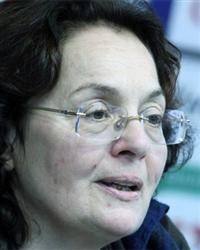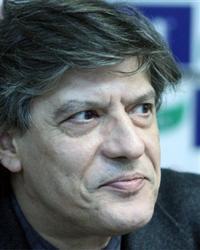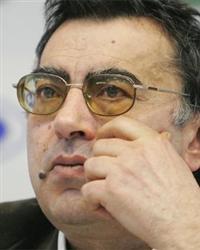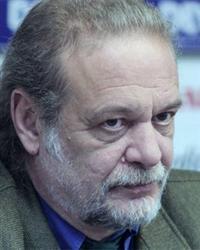
© Photo: BGNES
The chances of the new parties are interrelated to the stability of the old parties, says Prof. Rumiana Kolarova. In her opinion, there are political parties resembling “flashlights” – they emerge all of a sudden, quickly come to power and quickly leave it, but there are also such parties which gather momentum more slowly and are able to replace the major political actors of the day. "People in politics are often simply puppets and often the election campaigns resemble advertisements that invite us to the store, but in no way guarantee the quality of the product that they offer. For this reason, no matter how we might comment on personalities and programs that will be taken out of the political market, this will not give us the key to the real essence of the party and to how it would act once it came to power”, says Rumiana Kolarova.

© Photo: BGNES
Sociologist Anthony Galabov likens Bulgaria political life to a carnival with three different stages. The first stage is taken by the political parties which try to win voters by a certain ideology. The second stage is taken by populist players. The third stage and most interesting to analysts, however, is the one which is defined as a peculiar laboratory in which experiments are done. The principal actors in it are the civil movements which in recent months took to the streets to protest on several occasions, including the protests against the new Forests Act and the anti-counterfeiting trade agreement ACTA, and the extraction of shale gas in Bulgaria. Many of the protesters are young people who are active voters. Therefore, both ideological and populist actors are trying to attract their attention, says Prof. Anthony Galabov and adds:
"There are three thematic fields, which generate new political strategies. The first is nationalism and patriotism which is most often chosen by populist formations. At the same time, I do not currently see any rightist political movement here that sounds attractive enough for voters. These projects are still only within the realm of populism. The second thematic area is ecology. This is an area to which politicians will be resorting increasingly often. Young people are extremely sensitive on environmental issues. Part of the political programs will begin to "turn green" because visible active groups in Bulgarian society maintain such views. The third field is related to security and fear. We have reasonable grounds to believe that this is a separate topic around which public expectations about political representation are beginning to emerge. These three thematic fields are able to attract the support of distinct groups of Bulgarian society."

© Photo: BGNES
Sociologist Zhivko Georgiev is particularly optimistic and does not expect miracles. In his opinion, the ruling party GERB is facing a serious risk of collapse in the near future. "It still remains to be favorably seen mostly by the young and active population as the only “social elevator” for many major social problems, so it is hard to find a serious competitor”, says the sociologist. And political analyst Evgeni Dainov says the crisis radicalizes public sentiments and creates anger and a sense of injustice in people. Furthermore, citizens not only in Bulgaria but also in other European countries no longer believe in their countries and even less in supranational unions like the EU. "Bulgarian society is one of the few who trusts more the European civil servant than a Bulgarian cabinet minister," he adds. This opens up political space for new political parties, the analyst believes.

© Photo: BGNES
"Serious new political parties and formations are to emerge on the political scene here”, Evgeni Dainov predicts. “Most of them will enter parliament contrary to the expectations of most people. The winning new parties will be those that are capable to telling several things. First, how they will return to state to citizens, i.e. how they will protect citizens from unbridled officialdom, excessive red tape, greedy monopolists and oligarchs of all kinds who created a system where ordinary citizens are their serfs, as in the Middle Ages. Those political players who use language that is radical enough will increase their chances of entering parliament. And those who include issues of environmental protection in their package, they will surely have a large parliamentary group. Who could benefit from this situation? I think the main player are two - one is the future party of Meglena Kuneva, who is already talking about protecting citizens from monopolies, clerks and other predators, and the second will most probably be a nationalist formation. Most likely, this could be the new party called National Front for the Salvation of Bulgaria. They had good performance in the presidential elections, and if they play their cards right and enter into alliance with the IMRO (Internal Macedonian Revolutionary Organization), they will reap the nationalist vote and will enter the National Assembly for sure", says political Evgeni Dainov.
Translated by Rossitsa Petcova
The members of Parliament are rather skeptical before yet another attempt to elect a National Assembly Speaker. The candidates for Speaker of the National Assembly are Raya Nazaryan from GERB-SDS, Natalia Kiselova from BSP-United Left, Petar Petrov..
At today's session of MEPs opening in Strasbourg, the European Parliament will again call for full membership of Bulgaria and Romania in Schengen . The agenda announcement makes clear that the EP will discuss the issue together with the European..
The coalition We Continue the Change-Democratic Bulgaria (PP-DB) , which came second in the October 27 parliamentary elections, has accepted an invitation for negotiations from the first political force - GERB-SDS. GERB leader Boyko Borissov offers..
In mid-January this year, eight Bulgarian cultural and educational associations from Bosilegrad, Tsaribrod, Zvontsi, Vranje, Pirot and Niš sent an open..
Türkiye commemorates the victims of the devastating earthquakes of 2023 Türkiye honored the memory of the victims of the..

+359 2 9336 661
